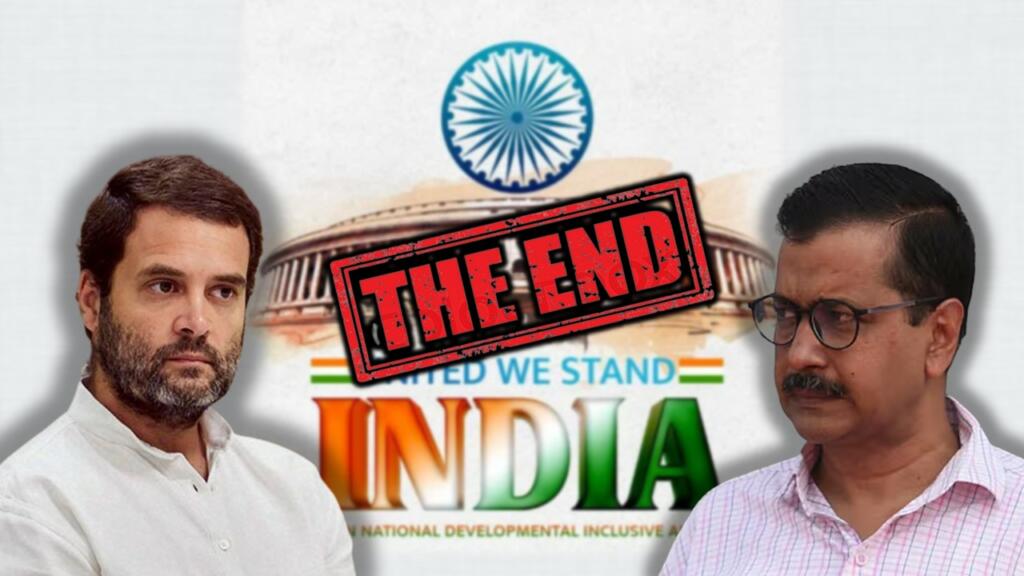The political landscape of India witnessed a swift and unexpected turn as the UPA 2.0, officially known as I.N.D.I.A. alliance, came to an abrupt end in Delhi. While many skeptics had their doubts about the success of the alliance from the beginning, the speed with which its dissolution occurred caught even the most astute political observers off guard.
According to AAP leader and now Congress member Alka Lamba, “In the three-hour long meeting, Rahul Gandhi, Kharge ji, KC Venugopal, and Deepak Babaria ji were present. We have been asked to prepare for the upcoming Lok Sabha elections. It has been decided that we will contest on all 7 seats. Seven months are left, and all the party workers have been asked to prepare for all seven seats.” Her revelation painted a picture of a strategic reorientation within the Congress camp.
#WATCH | Congress leader Alka Lamba says "In the three-hour long meeting, Rahul Gandhi, Kharge ji, KC Venugopal and Deepak Babaria ji were present. We have been asked to prepare for the upcoming Lok Sabha elections. It has been decided that we will contest on all 7 seats. Seven… pic.twitter.com/TKaHAIl2yW
— ANI (@ANI) August 16, 2023
As the dust settles, it’s crucial to dissect the underlying factors that contributed to this unforeseen turn of events. One primary reason that might have led to the alliance’s collapse is the loss of strength demonstrated during the Delhi Services Bill episode. The bill, which significantly curtailed the powers of Delhi’s Chief Minister, Arvind Kejriwal, demonstrated a lack of cohesion and resolve within the alliance. The inability to maintain a united front on critical legislative matters exposed chinks in the armor and sowed seeds of doubt about the alliance’s effectiveness.
Moreover, the alliance’s unraveling could also be attributed to the clear stance taken by the Aam Aadmi Party (AAP) regarding any potential partnership with the Congress. The AAP, under Kejriwal’s leadership, had made it explicitly clear that they would not consider forming an alliance with the Congress unless the latter provided unequivocal support during the Delhi Services Bill’s presentation in Parliament. This firm stand highlighted the uncompromising nature of AAP’s leadership and, inadvertently, set the tone for the alliance’s eventual breakdown.
Also read: I.N.D.I.A. alliance serves 2024 to BJP on a golden platter!
The fallout of the alliance’s demise extends beyond the immediate political realm. The decision to go solo in the upcoming elections not only reshapes the political landscape in Delhi but also underscores the shifting power dynamics within the Congress party itself. The move is indicative of a renewed sense of confidence within the Congress leadership, signaling a willingness to chart their own course rather than relying on coalition politics.
However, as observers and citizens alike, it’s crucial to view this development with a critical lens. The rapid dissolution of the I.N.D.I.A. alliance raises questions about the underlying dynamics and motives at play. While Alka Lamba’s account offers insight, it’s essential to remain open to the possibility of further revelations that might shed more light on the decision-making process within the Congress camp.
The aftermath of this split presents a fascinating narrative to follow. The alliance’s swift demise may have ended one chapter, but it opens the door to new possibilities and realignments in the lead-up to the Lok Sabha elections. How will the political landscape adjust to this shift? What new alliances and rivalries might emerge in the wake of this development? These are questions that will shape the narrative in the coming months.
Support TFI:
Support us to strengthen the ‘Right’ ideology of cultural nationalism by purchasing the best quality garments from TFI-STORE.COM
